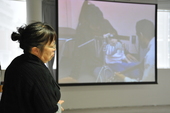Creative Café Vol. 4 "What kind of thing is musical therapy?" (2/2)pict
2010.02.27
What is musical therapy

DVD narration:Please turn down the lights. Please sit down firmly and sit up straight. Please sit up straight, and relax. Please relax. Please close your eyes and breathe deeply. Now breathe in. If you do this, your fatigue and feelings of tiredness will fly away I think. Now exhale quickly. Now, tiredness, feelings of discomfort and so on, can be expelled altogether.
DVD narration:now please use your imaginations a little. Now imagine grass, lying down on the lawn. Also all around you, it is remarkably peaceful isn't it? Imagine yourself in the middle of these peaceful surroundings. Also the grass on the lawn is very soft. Also the ground is very soft. Now please smell the grass and the soil. Also the sky is blue, with spring sunshine. It is very soft and warm, and extremely pleasant (you can feel the loss of your power in your arms, neck, head- all your body). How was that? It looks like you were all tired weren't you? Maybe some of you were actually sleep perhaps? (Laughter).
A:The music was good, and the softly spoken Chinese was very pretty-I was enchanted.
G:I went to sleep (laughter).
H:With relaxing music, relaxing words, subdued lighting, together they created a very soothing and healing environment I felt. In addition, saying 'become warm' or 'relax' perhaps there is a relationship with the autonomous nervous system.
Chen:Now, what you have just said is correct I believe. There is clearly a cumulative effect occurring. Through this, your hands become warm, you start to relax, and enter this state. However if there was no music and, for example, you just heard the narration, your hands would not become warm. The music is extremely important I believe. Everyone heard only one third of the DVD, after that, there is a creative section. We can create an environment in which creativity and beauty are stimulated and you can completely relax.
C:For example, the music we heard up to just now, it was artificial music created by people but the sounds of nature and the songs of birds was very effective wasn't it?
Chen:The sound of nature is very effective I think. But it is placed against the backdrop of a constant rhythm. For instance, if you just have the singing of birds or the sound of the ocean waves and so on, that is not enough. You have to think about and insert some kind of rhythm. Basically, it's a form in which you bring together various factors which each have some proven effect. This is a science of a work which has been put together in a very organic form.
The case of autistic children
Chen:Next, I would like you to look at this DVD.
 There is a case here about the reaction of children to musical therapy. It is Thomas who is an autistic child. He doesn't talk to anyone. He can speak but because he has hardly spoken to anyone, he hasn't received any training in the use of words. Through various encouragements, finally he could laugh from the bottom of his heart, and exchange feelings, as shown in these photographs.
There is a case here about the reaction of children to musical therapy. It is Thomas who is an autistic child. He doesn't talk to anyone. He can speak but because he has hardly spoken to anyone, he hasn't received any training in the use of words. Through various encouragements, finally he could laugh from the bottom of his heart, and exchange feelings, as shown in these photographs.
The child's mother comes into the treatment room. First, the first step of treatment. Now his mother has come out. The fact that both sides of his body are shaking is due to his illness. In reality this musical therapist adjusts the music to the child's rhythm, and this provides the treatment.
Stage 2. Now he is touching an instrument like musical chimes. But clearly he won't do so if he is not with his mother. But no words are coming. But gradually the musical therapist adjusts the treatment to a slower rhythm and is very patient in producing music which reduces his stress.
So to the third stage. The therapist hugs the child, and he climbs on top of the drum. It is very amusing. The therapist moves his body to the same rhythm and he laughs happily. This is really remarkable. Throughout this treatment there are no words spoken. Then he is thinking of singing a song. This is Spanish style music and he really looks happy. Such a result is very difficult to achieve. Through music, even with a child as damaged as this, we have been able to cause this level of enjoyment. It really is through the intervention of the musical therapist that a process of self-realisation is taking place.
Piano rhythm and healing
I'd like to play this wonderful music which is well-known in China. But I am not going to tell you its title. Also I won't tell you about its contents. Just listen. And then tell me about your various impressions. 'I hardly liked it', or 'that was a completely beautiful experience', or ' was rather alien' and so on; whatever you thought please inform us.
D:This was not an everyday feeling, rather unusual; I received a feeling of fantasy.
E:I disagree. A lake, sky, rather like nature.
F:It was such a smooth piece that I really enjoyed listening to it. A bit like today not a light image but, just like the weather outside, it was a song that calms you down if you listen to it.
G:Overall it was a minor melody, but here and there, you have the misunderstanding about it being in major, and a bright melody comes in half way; I got the impression of it being like the background music of being far away from your hometown. Therefore in the lighter parts, it brings back old memories, and I got the feeling that in the future I don't want to experience the sadness of being away from my birthplace.
Chen:you pointed out that there were parts in minor and major, in addition parts with an exceptional power, and parts which are extremely soft. So what was this melody's name? It is 'the flow of a stream'. It is a melody written to portray the scenery of Yunnan. It is a love song between man and woman, and I especially like it. It's not just because it's a love song but I particularly like the rhythm. It is a particularly beautiful melody and you can really receive a soft feeling. But in the middle you also get a feeling of 'Waa'; the feeling of talking with other people.
L:What came out in the middle of your conversation, training in rhythm, just like came out in the previous DVD, does it give you the feeling of performing
together?
--I don't know where it would be effective just through the feeling of sharing experience, probably more of a feeling of jointly solving something.
Chen:In reality, the reaction is different with each subject. Even though this rhythm training may suit this child, it may not suit another child. It varies from person to person. This is what the therapist has to design. I can say it is about sensitivity to music, or is it judgement based on sensitivity. Particularly with respect to children, the participatory approach is suitable. Because children hardly like words, it's not appropriate to base treatment on talking.

